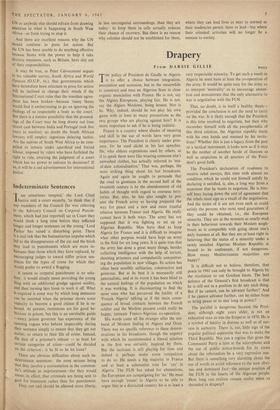Indeterminate Sentences
AM sometimes tempted,' the Lord Chief 'Justice told a court recently, 'to think that if any members of the Council [he was referring to the Advisory Council on Corporal Punish- ment, which had just reported] sat in Court they would think a long time before they inflicted longer and longer sentences on the young.' Lord Parker has raised a disturbing point. There iS a real risk that the humanitarian impulse which led to the disappearance of the cat and the birch may lead to punishments which are more in- humane than those which they have replaced, by encouraging judges to award stiffer prison sen- tences for the types of crime for which they would prefer to award a flogging.
A return to corporal punishment is no solu- tion: it would simply mean providing the young thug with an additional grudge against society, and then turning him loose to work it off. What Is required is some way by which long sentences can be remitted when the prisoner shows some capacity to become a good citizen if he is re- leased. At present, remissions are for good be- haviour in prison; but this is an unreliable guide --every prison governor has experience of the cunning rogues who behave impeccably during their sentence simply to ensure that they get out earlier, to return to their life of crime. Instead, the date of a prisoner's release — at least for certain categories of crime—could be decided on the criterion : is he fit to be let loose?
There are obvious difficulties about such in- determinate sentences: the most serious being that they involve a reorientation in the commun- ity's attitude to imprisonment—for they would mean, in effect, that criminals are being sent to gaol for treatment rather than for punishment.
They can and should be allowed more liberty, in less uncongenial surroundings, than they are today: to keep them in cells actually reduces their chance of recovery. But there is no reason why colonies should not be established for them, where they can lead lives as near to normal as their tendencies permit them to lead—but where their criminal activities will no longer be a menace to society.










































 Previous page
Previous page